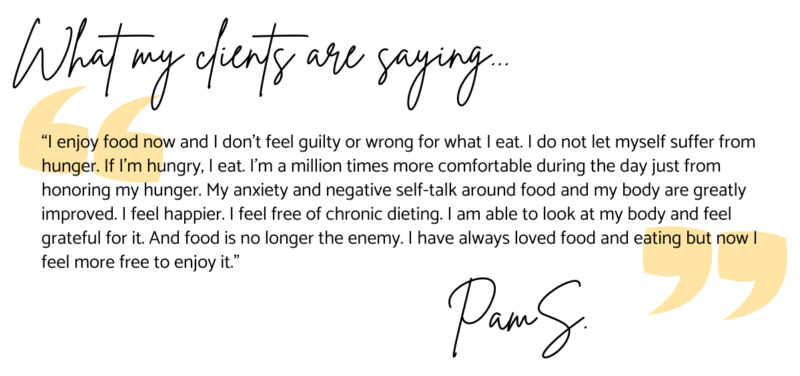One of the key concepts I bring up with new clients, sometimes right out of the gate, sometimes a bit later, is awareness. Because if we’re not fully aware of our habitual thoughts, feelings and actions, then we have no hope of changing or evolving.
But there’s a problem with becoming more aware of our thoughts, feelings and actions. And that problem is the messy middle.
The messy middle, or the uncomfortable intermediate phase, is when your awareness has increased, but you haven’t grown or changed much – yet. If some of your thoughts, feelings and actions are of a sort that you don’t exactly feel good about (“Oh my gosh…I really do that? And that often?” or “Why do I keep THINKING that?!?”), that can lead to a shame spiral.
And what happens when we feel shame? We shut down, we stick our head in the sand, we try to comfort or distract ourselves — possibly in ways that aren’t really supporting our well-being in the long run. That’s why awareness really needs to be paired with the trifecta of acceptance, non-judgment and curiosity:
- Accepting that we are all human, we all have flaws, and we also have the ability to grow
- Not judging ourselves for our very human flaws
- Being curious about why we do what we do, and why we think what we think

The messy middle of breaking up with dieting
One of the messiest middles I see in my work comes during the process of breaking up with dieting (or any pursuit of weight loss) and diet culture. If you’ve spent years (or decades) believing that pursuing weight loss is necessary for health and/or the ticket to being a valued, acceptable human, then giving up the fantasy is naturally going to be HARD.
When I say hard, I don’t necessarily mean intellectually giving up on the idea of pursuing weight loss like it’s your second job. I mean really, really giving it up in an embodied sense. To do this, you need to be able to move through the messy middle of:
- Fully assessing how much time/energy/money you gave to the diet industry and diet culture
- What it cost you
- How close it came to (or how far it moved you from) providing a sustainable solution to what you felt your problem was (whether that be weight itself, a lack of confidence or acceptance, or something else)
What happens if you don’t honestly assess why chasing weight loss didn’t bring you what you hoped for? Well, the magical thinking of “Maybe I should just try one more time…surely this diet will work/if I just try harder it will work” is going to continue to bubble to the surface.
Continuing to buy into the fantasy blocks you from growing, evolving, changing and creating the new habits you need to find peace with food, mind and body so you can be happier, healthier, and more satisfied with life.

Painful goodbyes and new beginnings
Leaving diet culture behind may mean facing the fear, sadness, or shame about what you’ve given up and what you haven’t “achieved.” This is awareness, and, again, this can feel hard. (OK, it can royally suck.) But doing this works allows you to come to terms with what was, and what is, it so you can start to move forward. This transition usually happens in three phases:
- Saying “goodbye.” Letting yourself grieve for the hopes and disappointments you experienced while you were invested in diet culture, perhaps even doing something to ritually mark that the past isn’t coming back.*
- The messy middle. Shedding old habits and behaviors and developing new ones, and learning how to accept thoughts and feelings that arise without being hooked by them if they are unhelpful or tempt you to resume old patterns.
- The new beginning. Practicing your new behaviors and making choices based on your deepest values, such as fully engaging in life in the body you have right now.
*For many people, this means tossing diet books and magazines and unfollowing people on social media who promote weight loss or restrictive diet/exercise routines. You can also write a letter describing your old magical thinking and where it didn’t get you, and burn it in a fire. You could bake a cake or plan a celebration (even a celebration for one, maybe a massage followed by a nice lunch). Or find something else that works for you. The ritual can help make the transition real and help you move on.

Knowing better, and doing better
In an ideal perfect world, we would never be wrong or make mistakes, and we would always achieve our goals effortlessly. Alas, that world does not exist!
Being willing to be wrong is a huge asset in living our best lives. I try to be transparent about how I was stuck in diet culture (personally) for many years, and how I even perpetuated it (professionally) for a while as I was stuck in my own messy middle. I saw the benefit of Intuitive Eating and a Health at Every Size approach while also seeing the research on weight loss for what it was…that the Emperor had no clothes.
I saw all this, yet I practiced “non-diet weight management” for a few years, until the little voice in my head whispering “this is not a thing” grew to a shout, and then a scream, and then I got out.
I am far from the only dietitian who’s had this experience. We are growing in number, we are sharing our experiences, and we are less likely to suffer in shameful silence than we are to say, “I was wrong, and now that I know better, I’m doing better.” A shout-out to Maya Angelou for that one.
Really, I see no shame in being wrong. The shame, if there is any, is in being wrong, knowing (or suspecting) that we’re wrong, and then just doing the same thing we’ve been doing. I would say rather than being shameful, that’s a damn shame (!) because when we stick to our old habits and beliefs in the face of evidence that those habits and beliefs aren’t serving us, we stagnate.
Need more help making changes that support health and well-being, without focusing on weight? Click here to schedule a free 20-minute Discovery Call to talk about your concerns, and if you would benefit from nutrition therapy.

Disclaimer: All information provided here is of a general nature and is furnished only for educational purposes. This information is not to be taken as medical or other health advice pertaining to an individual’s specific health or medical condition. You agree that the use of this information is at your own risk.
Hi, I’m Carrie Dennett, MPH, RDN, a weight-inclusive registered dietitian, nutrition therapist and body image counselor. I offer compassionate, individualized care for adults of all ages, shapes, sizes and genders who want to break free from eating disorders, disordered eating or chronic dieting. If you need to learn how to manage IBS symptoms with food, or improve your nutrition and lifestyle habits to help manage a current health concern or simply support your overall health and well-being, I help people with that, too.
Need 1-on-1 help for your nutrition, eating, or body image concerns? Schedule a free 20-minute Discovery Call to talk about how I can help you and explore if we’re a good fit! I’m in-network with Regence BCBS, FirstChoice Health and Providence Health Plan, and can bill Blue Cross and/or Blue Shield insurances in many states. If I don’t take your insurance, I can help you seek reimbursement on your own. To learn more, explore my insurance and services areas page.
 Print This Post
Print This Post






